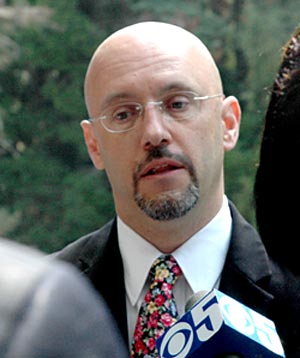UC Berkeley Web Feature
UC Berkeley's Alex Farrell joins governor in introducing low-carbon fuel standard for state
BERKELEY – California Gov. Arnold Schwarzenegger today (Friday, May 18) announced a proposed new low-carbon fuel standard for the state and praised the University of California scientists who worked intensively over the past four months to put it together.
 Alex Farrell was interviewed by reporters about proposed low-carbon fuel standards for the state of California (Robert Sanders photo) |
Making the opening remarks at an international symposium on low-carbon fuels held at Lawrence Berkeley National Laboratory, Schwarzenegger thanked UC Berkeley's Alex Farrell, assistant professor of energy and resources, and UC Davis' Daniel Sperling, director of that campus's Institute of Transportation Studies, for their key efforts to "measure the carbon output (of alternative fuels) throughout the full life of the fuel cycle, from exploration to refinery and production."
Farrell, Sperling and their joint, 20-person team not only looked at how to assess the carbon impact of fuels ranging from gasoline and biofuels to hydroelectric power, but produced recommendations to the California Air Resources Board (CARB) for policy changes needed to implement the standard. CARB is expected to adopt these policies in June as the most important of the "early action" items to meet the state's global-warming goals.
"With this historic low-carbon fuel standard, we can be a model to the rest of the nation and the world," the governor said. "The low-carbon fuel standard is our best weapon against rising oil and gas prices. It gives customers a choice and empowers them to say 'no' to high fuel prices, to say 'Hasta la vista, baby.'"
The last visit by Schwarzenegger was also energy related. On Feb. 1, he joined executives from the oil firm BP in announcing that UC Berkeley had been chosen to receive $500 million over 10 years for biofuels research - the kind of research that will help the state reach its long-term carbon reduction goals.
In his January 2007 State of the State address, Schwarzenegger announced plans to issue an executive order establishing standards for transportation fuels sold in the state, with the goal of reducing the carbon intensity of California's passenger vehicle fuels by at least 10 percent by 2020. This first-of-its kind standard would support emissions targets established last year by Assembly Bill 32, which committed the state to capping greenhouse gases.
Farrell and Sperling were asked by the air resources board to lead a UC team to develop a standard. Their study, which should be complete within two weeks, will be submitted to the Air Resources Board for review and for implementation by 2010.
According to Farrell, it is entirely feasible for the state to reach its goal of a 10 percent reduction in carbon emissions by 2020 through the use of a combination of current technologies including biofuels, hybrid vehicles and electric vehicles. With regard to biofuels, which today consist primarily of ethanol, he said that this goal could be reached without expansion of land to grow feedstocks for biofuels.
"California has more than enough capacity now to meet a five percent reduction in carbon emissions by 2020," he said, and can meet the 10 percent goal with a little more innovation in technology. "Innovation is the key to going way beyond a million alternative fuel vehicles on the road by 2020," said Farrell. "We need to change behavior and technologies to reach this goal."
Farrell emphasized that the proposed low-carbon fuel standards are meant to offer oil companies incentives for technological innovation and investment in alternative fuels, not to dictate the way in which companies will meet the standard.
"Government will not pick winners," Farrell and Sperling wrote in an op-ed piece that appeared in today's San Francisco Chronicle. "Fuel providers will choose how they reduce the carbon intensity of their products, from options such as blending low-carbon biofuels into conventional gasoline, selling low-carbon fuels such as hydrogen, or buying credits from providers of other low-carbon fuels (such as low-carbon electricity or natural gas)."
Sperling noted that the fuel standard "is not a panacea, they are not the only solution, not even for the transportation sector. But (creating a low-carbon fuel standard) is the most important policy initiative on transportation fuels, arguably, ever."

